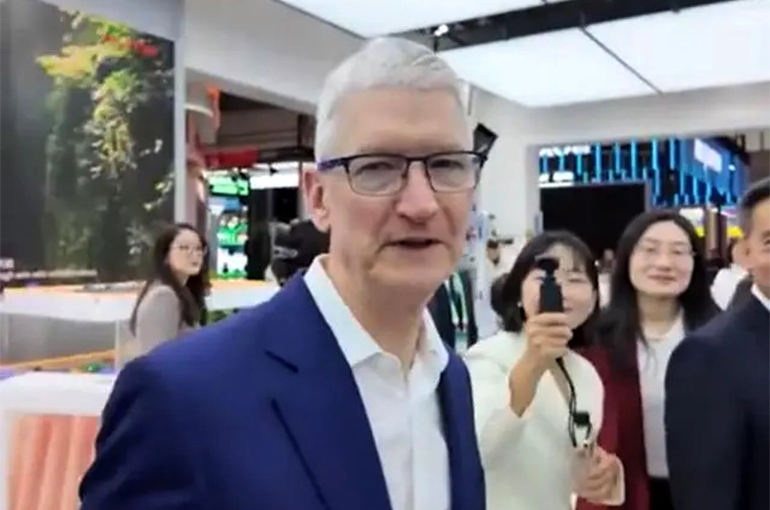 Apple CEO Tim Cook Visits China for Second Time in a Month
Apple CEO Tim Cook Visits China for Second Time in a Month(Yicai) Nov. 26 -- Tim Cook was in Beijing yesterday to attend the second China International Supply Chain Expo, making it the Apple chief executive’s second official visit to China in a month and his third this year.
Cook’s recent visits highlight Apple’s reliance on its Chinese supply chain, even as the US tech giant explores diversification to India, against the backdrop of potential policy changes in the United States and challenges in replicating China’s manufacturing ecosystem elsewhere.
“We could not do what we do without them,” Cook said in reference to Apple’s Chinese partners. “I value them very highly.”
More than 80 percent of Apple's 200-plus suppliers are based in China, according to its own figures. The country’s advanced manufacturing capabilities and well-established infrastructure have made it central to Apple’s global operations.
"We are very committed to China,” Cook said. “That's the reason I've been here three times,” noting that Apple's relationship with the country “will only get better.”
At a meeting with Commerce Minister Wang Wentao and Industry and Information Technology Minister Jin Zhuanglong in Beijing last month, Cook pledged to go on increasing investment in China, particularly in supply chain and research and development. During his March visit, he met with supply chain partners and opened Apple's new flagship store in Shanghai.
Higher US Tariffs
US president-elect Donald Trump is expected to levy higher tariffs on Chinese goods. That could hit Apple's earnings, according to analysts at Jefferies Group. In the worst-case scenario, the cost of each iPhone could jump by USD256, shrinking the firm’s gross margin by about 7 percent.
Regarding the likelihood of new US tariffs on China-made iPhone components, Canalys analyst Nicole Peng said the next administration will likely focus on high-end technologies such as artificial intelligence and advanced chips.
Chinese mainland-listed firms have not yet entered Apple's core chip supply chain, as they mainly provide parts for cameras, batteries, and thermal management components, Yicai learned.
India-Made iPhones
Meanwhile, Indian media outlets recently reported that Apple is in contact with more than 40 local suppliers to move part of its iPhone supply chain to the South Asian country.
Apple had assembled USD14 billion worth of iPhones in India as of March, accounting for 14 percent of the total. Early last year, the company notified its Indian suppliers that it was preparing to gradually increase the shares of India-made iPhones to between 20 percent and 25 percent in two years, up from just 7 percent last year.
But India lacks China’s extensive network of material and equipment manufacturers, and the local supply chain imports most parts from China, leading to high transportation expenses and driving up overall costs, an Indian investor told Yicai.
India’s infrastructure and power supply also need upgrading. Analysts believe that in the coming years, India’s growth in Apple’s supply chain will remain limited to final product assembly, while production of key electronic and mechanical components will largely remain in China.
Editors: Shi Yi, Futura Costaglione